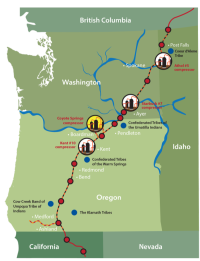“Our region is a national leader in renewable energy and protecting clean air and water. We are taking a stand against another misguided fossil fuel project.”
-Audrey Leonard, Staff Attorney
FOR IMMEDIATE RELEASE
Columbia Riverkeeper Challenges New Gas Pipeline Infrastructure
Group Files Appeal of FERC’s Approval of Coyote Springs Compressor Station
Portland, Ore. (Aug. 26, 2022)—Today, Columbia Riverkeeper (Riverkeeper) filed a petition for rehearing to the Federal Energy Regulatory Commission (FERC) challenging its approval of a $32.5 million fracked gas pipeline compressor station, called Coyote Springs, proposed near Boardman, Oregon.
"The negative health and climate impacts of fracked gas are clear," says Patrick O'Herron, MD, of Oregon Physicians for Social Responsibility. "We can't afford to be investing in actions that harm our health and simultaneously worsen climate disruption which is causing unprecedented storms, floods, droughts, heat waves, and wildfires."
FERC issued a license to Gas Transmission Northwest (GTN), a company owned by TC Energy (the Canadian fossil fuel company behind Keystone XL), to build new infrastructure to increase the pressure of fracked gas in its pipeline system.
Approving new fracked gas infrastructure is inconsistent with Oregon’s and Washington’s climate goals, which call for a rapid reduction in fossil fuel use.
“Our communities are already feeling the impacts of climate change,” said Maig Tinnin from community organization Rogue Climate. “The only way to meet our climate goals is to stop building new fossil fuel infrastructure and to transition to clean energy and greater energy efficiency.”
“Our region is a national leader in renewable energy and protecting clean air and water,” said Audrey Leonard, Staff Attorney at Columbia Riverkeeper. “We are taking a stand against another misguided fossil fuel project.”
The Coyote Springs compressor station is proposed at the same time and on the same pipeline as the GTN XPress project, which would expand the mainline capacity by 150,000 dekatherms per day, resulting in more annual greenhouse gas pollution than all commercial buildings in the state of Washington. Compressor stations are large industrial facilities that regulate the pressure of gas through a pipeline. Columbia Riverkeeper recently submitted comments to FERC on GTN XPress, urging FERC to consider the cumulative impacts of both pipeline projects. Washington, Oregon, and California also commented to oppose GTN XPress and filed a motion to intervene, saying the expansion would undermine the states’ climate goals.
FERC released its approval of the Coyote Springs compressor station on July 28, 2022. The agency has 30 days to respond to Columbia Riverkeeper’s petition for rehearing.
GTN operates a 1,353 mile fracked gas pipeline that runs from Kingsgate, British Columbia, through Idaho, Washington, and Oregon, down to Malin, Ore.
About Columbia Riverkeeper
Columbia Riverkeeper’s mission is to restore and protect the water quality of the Columbia River and all life connected to it, from the headwaters to the Pacific Ocean. Columbia Riverkeeper is a non-profit organization with over 16,000 members who live, work, and recreate throughout the Columbia River Basin.
Resources:
- Map of GTN Pipeline
- Coyote Springs Petition for Rehearing
- Rogue Climate GTN XPress comments
- Oregon Physicians for Social Responsibility GTN XPress comments
Support Columbia Riverkeeper’s important work to protect our climate from more fossil fuels.



